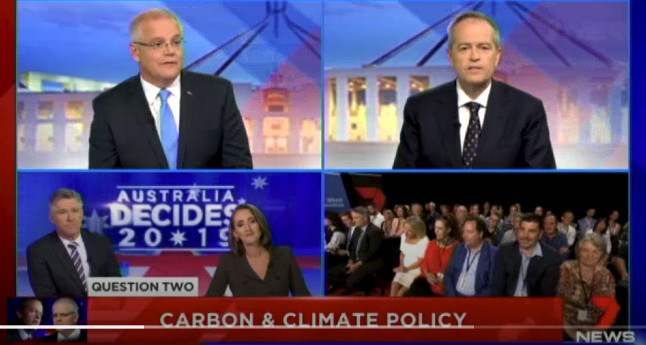
I watched the "Leadership" debate live on 7-NEWS from Western Australia on free-to-air digital on April 29, 2019.
I already expected to like Bill Shorten much more than Scott Morrison, having experienced the last 6 years of LNP government, and I did find Bill Shorten most compelling in giving a case for a change of government. Scott was bluster, and he identified border security and budget surplus management as big achievements.
Bill Shorten let him bluster on for a bit for a few times, while smiling calmly, and then give reasonably clear meaningful replies, and made a good case for change, namely that many things generally are developing to cause distress for so many people, that perhaps a new government should work to take meaningful actions.
Bill Shorten used examples that ALP research and policy must have identified as most frequent common and visible public concerns. I notice that Australian political parties are not generally targeting the growing poverty traps and holes with improved welfare services at the bottom. The numbers of homeless and unemployed continue to grow in our society.
Scott Morrison wanted a "cost" on ALP Climate change strategies. Bill Shorten said the costs of not taking action were much more relevant. No questions were asked on approvals for the Adani Coal Mine, nor the Gas mining expansion planned for the Northern Territory. No questions on the influence of foreign donations on mining approvals, for these mines mostly benefit their foreign investors and corporate owners. All new fossil fuel mines are incompatible with keeping the lid on climate change, since there are plentiful global reserves already being mined to take us all the way to hell. They are "stranded assets" in the full meaning of the term, that will never return their total investment.
There is already a general problem with economic growth and with the global financial system. In total, the sum of global investment and its benefits give returns that are very inadequate to pay off rising debts. This is directly traceable to the rising costs of fossil fuel energy, and now renewable energy is cheaper and has better returns on investment. There is also the question of huge logistic costs in maintaining massive military and weaponry, and repressive governments. These are costs of the dark side of government that no one talks about.
ALP have a policy of having a Federal ICAC with real teeth, so obviously required, given the very low standards of the LNP.
It is all true enough. The heart of the matter is the GDP is proportional to money and energy usage, linked to carbon emissions, and a "de-coupling" from material costs isn't going to happen all the way, or all that fast, and real climate action requires sacrifice of real GDP. Of course if we stop wasting GDP on stuff we can arrange to do without, and invest more of it into cheaper renewable energy, other possibilities are more likely to emerge, if flexibility for change is allowed. Debates on TV are about the easily assimilated familiar, not for explaining the inconvenient details. A detail not to be highlighted, is that apart from massive growing wealth inequality, the GDP also includes the growing costs of getting energy and materials, leading to creeping rises in costs of services, and lower purchasing power for all. The scope for government delivery of promises, and for funding the investment in transition to equitable survival in a resource poor world, continues to deteriorate. We are running out of time faster.
Bill Shorten rightly castigated the last 6 years as a waste of time for failures to change energy and climate change policy.
Scott Morrison wants people to be frightened of taking actions that might have a short term cost right now, and scare the small proportion of pensioners that are so fortunate as to also have self-managed super.
Bill Shorten & ALP , and the voting public should know by now, we already have growing climate impact costs on real wealth, because the GDP contains new climate change features, which measures all the growing drought, floods, fires and their insurance costs, and restitution costs. GDP includes extra energy consumption and more carbon emissions used to rectify climate impacts. Climate change impacts continue to be a growing debt-damage interest cost on the economy, one that will soon enough, be causing economic contraction faster than all our best efforts at economic growth. It will only continue to loom larger the more we ignore it.
Add Comment
This policy contains information about your privacy. By posting, you are declaring that you understand this policy:
This policy is subject to change at any time and without notice.
These terms and conditions contain rules about posting comments. By submitting a comment, you are declaring that you agree with these rules:
Failure to comply with these rules may result in being banned from submitting further comments.
These terms and conditions are subject to change at any time and without notice.
Comments